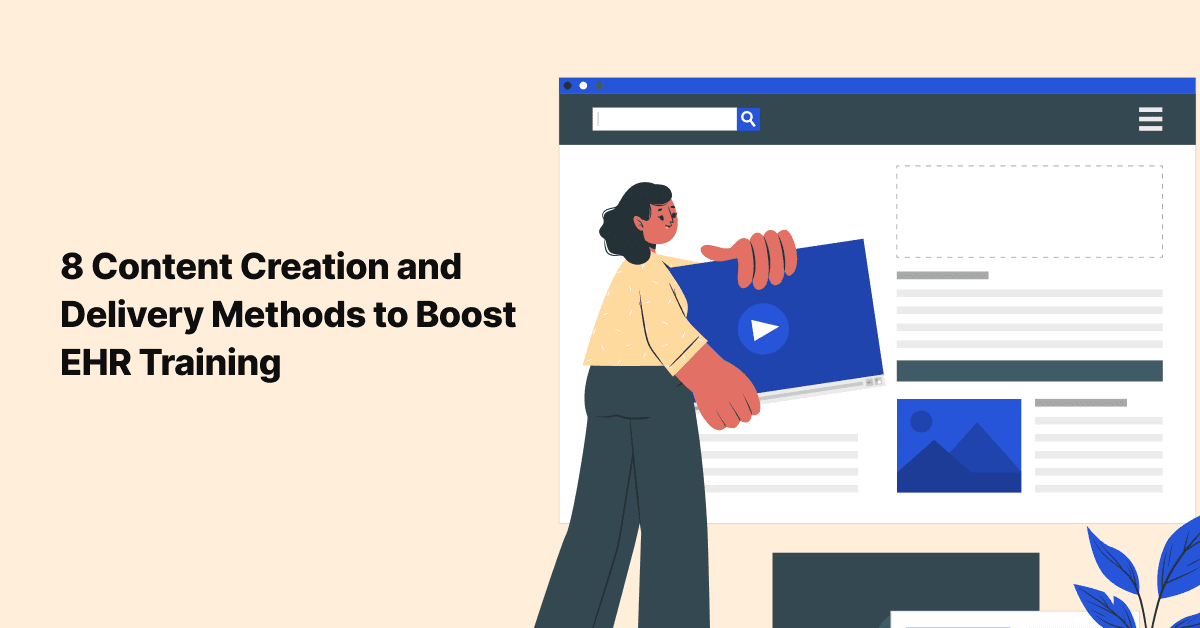
Maximizing Your Investment Through Microlearning and Video
Historically, EHR training at hospitals has comprised of:
- Classroom Training
- Emailed Tip Sheets
However, these …

In the bustling realm of healthcare, where every second counts, Electronic Health Records (EHRs) are like trusted guides, assisting healthcare professionals in delivering top-notch care. But to unlock the full potential of these digital companions, healthcare heroes need the right EHR training.
So, picture this: You’re on a quest to provide your team with the best EHR training. What’s your most potent weapon? It’s mastering the art of EHR training content creation and delivery.
In this blog post, we’ll reveal eight secrets to mastering EHR training, ensuring that your healthcare staff becomes proficient and confident EHR users.
Customized learning paths are like bespoke suits tailored specifically for healthcare professionals. EHR training isn’t one-size-fits-all. Different roles require unique skill sets. By personalizing training content, you ensure that each individual receives precise, effective, and engaging guidance.
For example, nurses might need to focus on patient record management, while physicians may require in-depth knowledge of order entry systems, and the training needs of ENT physicians would be different from ER physicians. Customization ensures they get the right EHR training for their role.
Microlearning breaks down complex EHR concepts into bite-sized, easily digestible modules. These short bursts of information are designed to optimize knowledge retention, just like how a nutritious snack fuels your energy without making you feel too full.
For busy healthcare professionals, microlearning allows them to squeeze in valuable learning moments throughout their day, like having quick power snacks that keep them fueled and focused.
In today’s fast-paced world, mobile learning is the hero we need. It offers accessibility and flexibility while also adapting to the on-the-go lifestyle of healthcare professionals.
Imagine a nurse diving into an EHR module in between patient visits or a physician deep-diving into EHR intricacies from the comfort of their couch. Mobile learning fits seamlessly into their busy schedules, like having their training materials conveniently tucked into their pockets.
Utilizing short video tutorials is a highly effective method for conveying complex EHR processes and workflows. These visual learning tools engage learners and facilitate a more intuitive understanding of intricate details. Video-based tutorials offer a dynamic and interactive approach to delivering essential EHR training content, ensuring it is both informative and engaging.
Data is not merely a string of numbers; it’s a wellspring of wisdom. Analyzing training data enables trainers to measure effectiveness and fine-tune their methods. It’s akin to Jedi training, ensuring your EHR training program evolves in sync with the needs of your learners.
Much like a wise Jedi Master who hones their skills through diligent practice and reflection, data provides valuable insights that guide your training program to greatness.
Imagine you’re a training coordinator analyzing data to identify which modules resonate most with your team. Insights from data help you make informed decisions and adapt your approach for maximum impact, ensuring your training program evolves with the evolving needs of healthcare professionals.
Encouraging peer assessment and collaboration is a powerful way for healthcare professionals to learn from each other. They can share each other’s EHR best practices and draw from their peers’ experiences. This collaborative approach not only deepens understanding but also creates a supportive learning environment.
Read more about Collaborative Learning in EHR Training here.
Integrating AI-powered chatbots into your EHR training program is like having a knowledgeable assistant available around the clock. These virtual helpers provide real-time answers to queries, offer guidance, and help troubleshoot issues. Think of them as the friendly hospital receptionist who is always ready to assist patients. They ensure continuous learning and support, making it easier for healthcare professionals to seek assistance whenever they need it, just like having a helpful colleague by their side.
Feedback is more than just a feature; it’s the compass guiding the learning journey. Continuous assessments and support mechanisms help healthcare professionals track their progress, identify strengths, and address areas that need improvement. It’s the mechanism that propels them forward by providing clear direction and helping them stay on course.
It’s like a GPS system that provides clear directions, ensuring they stay on the right path to becoming EHR experts.
In the fast-paced world of healthcare, where patient care and accuracy are paramount, mastering EHR training is not an option—it’s a necessity. In this journey, we’ve uncovered eight powerful methods for efficient content creation and delivery.
From customized learning paths that tailor education to each healthcare professional’s unique needs to the invaluable insights drawn from data-driven assessments, these methods are the keys to unlocking proficiency and confidence in EHR usage.
Remember, EHR training is not a one-time endeavor but a continuous process that evolves with technology and the needs of healthcare providers. By implementing these strategies, you’re not just equipping your team with the skills they need today; you’re preparing them for the challenges and innovations of tomorrow.
Join over 3,200 subscribers and keep up-to-date with the latest innovations & best practices in Healthcare IT.

Historically, EHR training at hospitals has comprised of:
However, these …

It’s far more rare at the moment to find organizations that aren’t willing to adapt to virtual tools to …

As technology evolves, it is important for healthcare organizations to keep up with the latest trends in order …